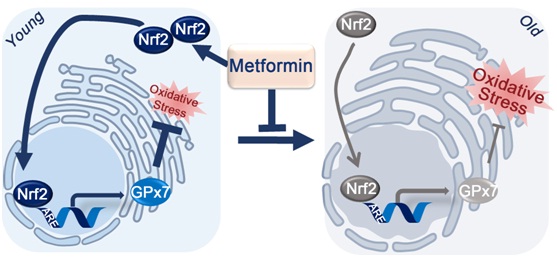A research entitled “Metformin alleviates human cellular aging by upregulating the endoplasmic reticulum glutathione peroxidase 7” was published online in the Aging Cell journal on Apr. 16h, 2018. Prof. WANG Chih-chen’s group in cooperation with Prof. LIU Guang-Hui’s group report that chronic low-dose metformin treatment upregulates the endoplasmic reticulum-localized glutathione peroxidase 7 (GPx7) and delays aging in human cells.
Metformin, an FDA-approved first-line drug fortreating type 2 diabetes mellitus, has been used clinically for over 60 years for its effectiveness, safety, and low cost. And recently, the effects of metformin on elongating lifespan have been demonstrated in some animal models. Nevertheless, whether metformin can suppress human cellular aging and the mechanisms underlying its probable geroprotective effects in humans remain unclear.
The researchers in Prof. WANG and Prof. LIU’s groups report that chronic low-dose metformin treatment increases the life span of human diploid fibroblasts (HDFs) and human mesenchymal stem cells (HMSCs). Metformin activates an antioxidant transcription factor Nrf2 and transcriptionally upregulates the expression of the ER-localized GPx7. A previous study from Prof. WANG’s group shows that GPx7 is a key enzyme involved in regulating the oxidative protein folding and maintaining the ER redox homeostasis (Antioxid Redox Signal, 2014). In this study, they show that the expression of GPx7 diminishes during human cellular aging and knocking down of GPx7 accelerates the aging process of human cells. Additionally, GPx7 protein level increases in the Nrf2-genetically enhanced stem cells generated by Prof. LIU’s group (Cell Research, 2017). Interestingly, metformin-Nrf2-GPx7 axis also functions in organism aging using C. elegans as a model. GPX-6 (ortholog of human GPx7) is required for the positive effects of metformin on life span extension in worms.
Their study provides mechanistic insights into the beneficial effects of metformin on human cellular aging and highlights the importance of the Nrf2-GPx7 pathway in pro-longevity signaling.
Associated Prof. WANG Lei (from Prof. WANG Chih-chen’s group) and Prof. LIU Guang-Hui from the Institute of Biophysics are the co-corresponding authors. Prof. ZHANG Hong provides great support in this study. FANG Jingqi and WU Xun from Prof. WANG’s group and YANG Jiping from Prof. LIU’s group share the first authorship.The study was supported by the National Key R&D Program of China, National Natural Science Foundation of China, Strategic Priority Research Program CAS and Youth Innovation Promotion Association CAS.
Article link: https://onlinelibrary.wiley.com/doi/full/10.1111/acel.12765

A model illustrating metformin delays aging through the Nrf2-GPx7 pathway
Contact: WANG Lei
Institute of Biophysics, Chinese Academy of Sciences
Beijing 100101, China
Phone: 86-10-64888501
Email: wanglei@moon.ibp.ac.cn
or
Contact: LIU Guang-Hui
Institute of Biophysics, Chinese Academy of Sciences
Beijing 100101, China
Phone: 86-10-64888315
Email: ghliu@ibp.ac.cn